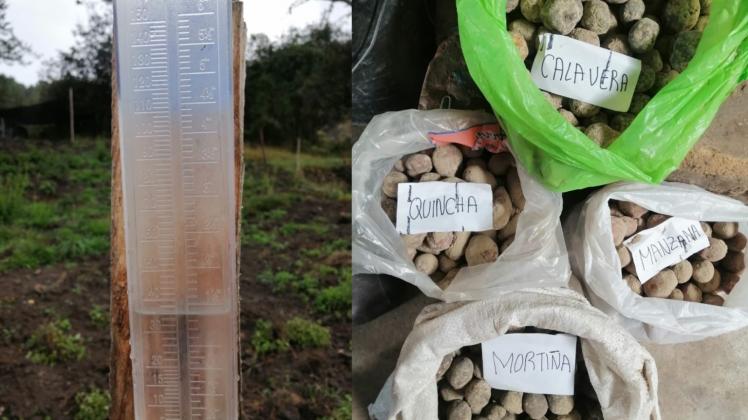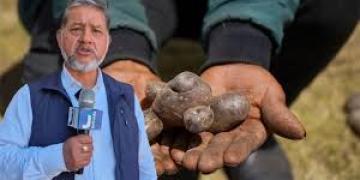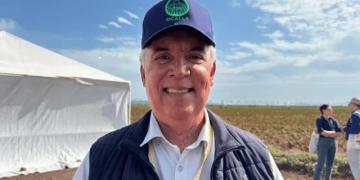Colombia: Rural communities research and conserve native potatoes in Boyacá
Through rural science laboratories, farmers in Boyacá share ancestral knowledge and systematize best practices to preserve some of the 850 native potato varieties found in Colombia.

According to the Colombian Agricultural Research Corporation (Agrosavia), Colombia has 850 native potato varieties , making this tuber one of the most diverse foods in the country. However, the mass marketing of species such as R12, betina, and pastusa has left many Colombians unfamiliar with the others, leading to a decrease in demand and jeopardizing the conservation of their seeds.
Currently, these varieties are considered an ancestral heritage of indigenous and peasant communities , who have dedicated themselves to preserving them, understanding that their plurality of colors and flavors reaffirms that Colombia is also a powerhouse in food diversity .
Faced with this situation, sciences such as agroecology are gaining increasing traction, as they propose a relationship with the land outside of large-scale industrial dynamics. Instead, they advocate the need to implement good practices that respect natural cycles , such as agroforestry, responsible water management, crop diversity, organic fertilizers, and, specifically, seed recovery .
For this reason, in Boyacá, a group of seven peasant researchers is conducting research and experimentation sessions to better understand the adaptability, resilience, and potential of different native potato varieties.
The agroecological rebirth of Tasco
According to the Regional Center for Productivity and Innovation Management of Boyacá (CREPIB), potatoes are the main crop grown, representing 80% of seasonal crops.
In the municipality of Tasco , the transition towards more conscious agriculture began to take shape in 2022, when Johanna Alvarado and six peasant researchers from her community—three women and three men, between the ages of 37 and 55—decided to embark on a research project focused on native potatoes:
“We started it as an alternative to change our eating habits. We had been growing conventional potatoes using agrochemicals, and for the sake of health and well-being, we decided to switch to growing organic potatoes ,” says Johanna.
They started with 10 varieties, and since then, the observation and selection process has led them to work with four: Mortiña, Calabera, Quincha, and Manzana. The project has focused on identifying which varieties best adapt to the soil conditions and climate change :
"We’ve noticed that the Quincha and Manzana varieties are more susceptible to insect attacks; the others have been more resistant. On the higher farms, the potatoes are smaller, but have a good foliage yield [the growth of leaves, stems, and branches]. We’re waiting for the May harvest to determine the yield. We hope it will be successful."
The project is being developed on plots located on various farms and at different altitudes, ranging from 2,800 to 3,100 meters above sea level. This diversity of soils and climates allows for a more detailed evaluation of the adaptability of each variety, results that they hope to systematize in the near future with the support of Swissaid .
His experience is part of the Agroecological Laboratories for Adaptation to Climate Change (AeD-LABs)
, an initiative promoted by the international cooperation agency, in partnership with rural communities in Colombia, Ecuador, Nicaragua, and Switzerland. These microlaboratories are community spaces for experimenting, sharing, and strengthening their own knowledge of agroecological practices.
“When it’s very rainy or summertime, we look at the resistance of each variety, which one has the most foliage, and which one adapts best. The goal is to verify that organic farming is possible (…) We keep records of planting data, fertilizer use, and pest attacks we find on crops, among other things. We also have tools like a thermometer and a rain gauge to record the amount of rainfall, and we have the support of a Swissaid agricultural engineer who advises us on the technical side,” the rural researcher notes.
The project, which will run until 2026, seeks to build a repository of appropriate agricultural practices to ensure crops survive climate change. It also includes the characterization of adapted varieties , a catalog of native potatoes, and tools for rigorously analyzing the results.
"These farmers know there are things that work, but they don’t keep records or share them. Systematizing them will allow other people to learn from what they’re doing ," explains Yeny Carrillo, researcher for Swissaid’s AeDLABS project.
On the other hand, both the organization and the farmers recognize that conservation is not enough. It is also essential that these varieties find a place in the market so that consumers become aware of them and appreciate their conservation more.
With its research, Swissaid has more precise information on native potatoes, which will be systematized in the future to serve other farmers on the continent. | Photo: Courtesy - Johanna AlvaradoA successful example of the adaptation of agroecology to the market is the case of farmer Jaime Aguirre, who, through his business venture "Ancestrales ," managed to transform native potatoes into chips that are now sold in Carulla, Éxito, and restaurant and hotel chains. According to Aguirre, his project demonstrates to other farmers, who are just in the process of creating a business model, how these ancestral seeds and foods can make their way into a market dominated by monocultures and large industries.
In Tasco, peasant knowledge about potatoes is cultivated every day through these laboratories: key research and information are shared to restore the country’s nutritional diversity and shift toward more environmentally responsible rural practices.
Fuente: colombiavisible.com




